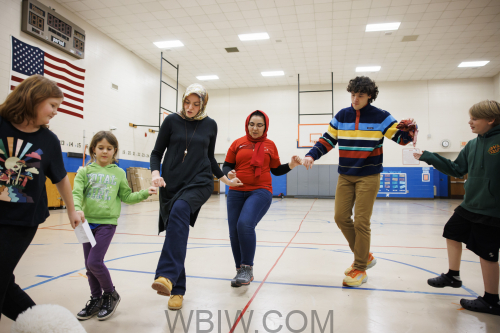
BLOOMINGTON – A small group of students stands in a circle in the Highland Park Elementary School gymnasium, singing “duck, duck, goose” in Turkish and erupting in laughter as a student drops a scarf behind her peer and a chase ensues. They’re led by a group of three volunteer instructors from Indiana University, who not only teach students of varying ages the language but also make sure they all stay engaged and feel included in the activities.

The Turkish club at Highland Park is part of the Bridges: Children, Languages, World program at IU, where student volunteers teach less commonly taught languages to K-6 students at several schools in Monroe County. The program is a collaboration among the Title VI National Resource Centers in the Hamilton Lugar School of Global and International Studies and the School of Education.

“The goal is to introduce elementary school children to the languages and the cultures from which the languages come,” said Bridges supervisor Carl Pearson, associate director of the Center for the Study of the Middle East. “We hope that the children feel by the end of a semester or year that they have a little bit of ownership of the language and that they can use it and talk a bit with classmates and teachers. We also hope it will instill an enduring interest in other cultures.”
The free program is open to all students at the schools where Bridges is offered and meets weekly after school. Bridges also regularly offer programming at local community centers.
The languages taught vary each semester but have included Arabic, IsiZulu, Norwegian and Uzbek, among many others, over the years.

During the last fall semester meeting of the Turkish club at Highland Park, student participants sang Turkish songs, learned Turkish dances, and play games where they recited numbers and colors in Turkish while passing a ball around.

Cassidy Rockhill, principal at Highland Park, requested that Bridges offer Turkish at the school because it has anywhere from two to 12 Turkish students enrolled every year. In addition to making those students feel welcome, he said the program offers young children an invaluable opportunity.
“I am a believer in public education being the way for students to lift themselves out of whatever challenges they may face,” Rockhill said. “We have to help them break their own ceiling of what they can be, so to open their eyes not only to a language but also culture outside of rural Indiana — how great.”
Rockhill said some children are engaged in the program for several semesters, and at least one family has had all six of their children participate in Bridges.
Elementary students aren’t the only ones who benefit from involvement. Erol Algan, a volunteer instructor who is studying Central Eurasian studies and folklore at IU, said being involved with Bridges has been one of his most rewarding experiences at the university.
“I come from a Turkish background, but I was born in the U.S., so I have a lot of attachment from my ancestral culture and history,” Algan said. “Being a part of this program has not only allowed me to explore a lot of the cultural aspects of Turkey but also to share them with younger students.”

Algan hopes to become a government ambassador or diplomat someday and said he was surprised to find parallels between teaching Turkish to young children and his future career ambitions.
“I’ve found that, especially with young kids, you have to be very careful and very cognizant of what you’re saying and how you’re speaking,” he said. “Sometimes they might do something they shouldn’t do, and it’s a balance between showing them what was wrong and keeping a certain level of dignity in what you say to them — that’s incredibly important in ambassador work.”
Bridges will resume classes in February at several schools in Monroe County, offering Mandarin Chinese, Modern Greek, Persian, Russian, Hindi, Portuguese, Swahili, and Turkish. The program also plans to offer Swahili at the Ferguson Crestmont Boys and Girls Club.
Information: Barbara Brosher News at IU.



